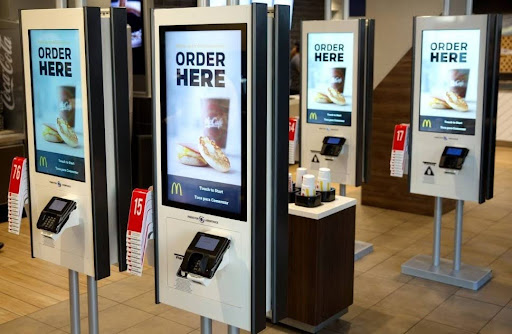In today’s fast-paced world, convenience is key. As technology continues to evolve, businesses are increasingly adopting self-service kiosks to streamline transactions and enhance customer experiences. These interactive machines allow customers to complete a variety of tasks without the need for direct assistance from staff, making them an essential part of modern business operations. Whether used for ordering food, checking in at airports, or making purchases, self-service kiosks have transformed how businesses interact with customers and revolutionized convenience in modern transactions.
In this article, we’ll explore the benefits of self-service kiosks, the different industries utilizing them, and the ways in which they are changing the customer experience.
What Are Self-Service Kiosks?
Self-service kiosks are automated, interactive machines that allow customers to perform tasks independently, without the need for human assistance. Typically equipped with touchscreens, these kiosks enable users to select options, input information, and complete transactions quickly and efficiently. They are commonly found in public places like restaurants, airports, retail stores, and healthcare facilities.
The versatility of self-service kiosks means they can be customized to serve a variety of functions, including:
- Order placement: Customers can browse menus, select items, and make payments at their convenience.
- Check-in/check-out: Guests at hotels or airports can use kiosks to check in, print boarding passes, or access other services.
- Information access: Kiosks can display maps, event schedules, and other essential information in places like malls, museums, and tourist attractions.
- Payment processing: Self-service kiosks are used to accept payments for goods and services, reducing wait times for customers.
The Key Benefits of Self-Service Kiosks
1. Enhanced Customer Convenience
One of the primary reasons businesses adopt self-service kiosks is to improve convenience for customers. By allowing customers to complete transactions on their own terms, kiosks help eliminate long lines and reduce wait times. Whether it’s ordering food at a restaurant or checking in for a flight, customers appreciate the ability to manage their own experiences at their own pace.
2. Increased Efficiency and Productivity
Self-service kiosks enable businesses to operate more efficiently. With fewer staff needed to assist customers, employees can focus on other tasks, such as managing operations or addressing more complex customer queries. This not only improves overall productivity but also helps businesses serve more customers in less time, especially during peak hours.
3. Cost Savings
For businesses, investing in self-service kiosks can result in significant cost savings in the long run. With fewer employees required for transaction-based tasks, businesses can reduce labor costs and allocate resources to other areas. Additionally, kiosks can process transactions quickly and accurately, reducing human error and the costs associated with mistakes in manual processes.
4. 24/7 Availability
Self-service kiosks offer businesses the ability to provide services around the clock. Unlike traditional retail stores or service desks, kiosks don’t require employees to be present, meaning customers can interact with them at any time of day or night. This is especially useful for businesses in industries like travel, food service, and retail, where 24/7 accessibility can improve customer satisfaction.
5. Improved Accuracy
With self-service kiosks, transactions are processed directly through the machine, reducing the potential for human error. For example, in a restaurant setting, customers can customize their orders and review selections before confirming, ensuring accuracy in the order process. This leads to fewer mistakes, faster service, and increased customer satisfaction.
6. Contactless Transactions
In the wake of the COVID-19 pandemic, self-service kiosks have gained popularity as a safer alternative to face-to-face interactions. They allow customers to perform tasks without coming into close contact with others, reducing the risk of spreading germs. Many kiosks are also equipped with features like card payment systems or mobile app integration, ensuring that transactions remain hygienic and contactless.
Industries Embracing Self-Service Kiosks
1. Retail
In the retail industry, self-service kiosks are being used for everything from product selection to self-checkout. Retailers are increasingly adopting these kiosks to streamline the shopping experience, making it faster and more convenient for customers. Self-checkout kiosks, for instance, allow shoppers to scan, bag, and pay for items without the need for cashier assistance, reducing wait times and enhancing convenience.
2. Food Service
Self-service kiosks have become a staple in fast-food chains, casual dining, and cafes. Customers can browse the menu, customize their orders, and pay without waiting in line. This not only speeds up the ordering process but also reduces errors in communication between customers and staff. Many kiosks in restaurants also feature loyalty programs, allowing customers to earn rewards with each transaction.
3. Airports and Transportation
Airports have long been using self-service kiosks for check-in and boarding pass printing. These kiosks have significantly reduced wait times and helped travelers navigate through airports more efficiently. Additionally, self-service kiosks are increasingly used for baggage drop-off, ticketing, and other services in transportation hubs like train stations and bus terminals.
4. Healthcare
In healthcare facilities, self-service kiosks are being used for patient check-in, appointment scheduling, and bill payments. These kiosks help reduce administrative burdens and allow patients to check in quickly upon arrival, speeding up the overall process. In addition, healthcare providers are using kiosks to gather information from patients before their appointments, streamlining the check-in process and improving patient flow.
5. Hospitality
In hotels, self-service kiosks allow guests to check in, check out, and make special requests without waiting in line at the front desk. This helps to improve the guest experience by providing a more seamless and efficient check-in process. Additionally, self-service kiosks can provide guests with information about hotel amenities, local attractions, and more.
The Future of Self-Service Kiosks
As technology continues to advance, the role of self-service kiosks is expected to grow. Innovations such as AI integration, facial recognition, and voice-enabled kiosks are likely to make the user experience even more intuitive and efficient. In addition, businesses will continue to develop personalized kiosk experiences that can offer customized recommendations, promotions, and loyalty benefits.
Moreover, the continued push for contactless interactions and streamlined operations across industries will only increase the demand for self-service kiosks in the years to come.
Conclusion
Self-service kiosks are reshaping the way businesses interact with customers, offering increased convenience, efficiency, and cost savings. From fast food restaurants to airports and retail stores, self-service kiosks provide a quick, accurate, and contactless way to handle transactions and enhance customer satisfaction. As businesses continue to adopt this technology, the future of self-service kiosks looks promising, making them a key player in the ongoing evolution of modern transactions.




